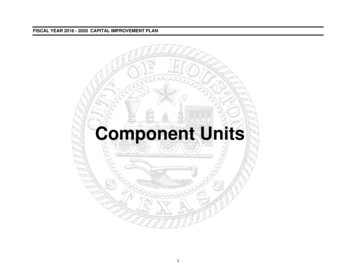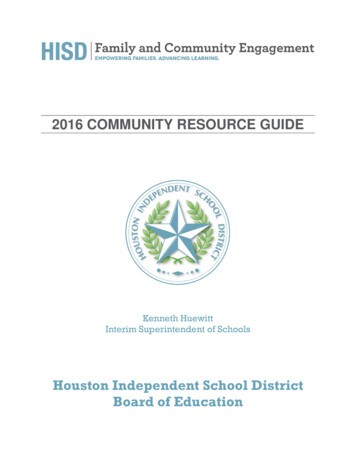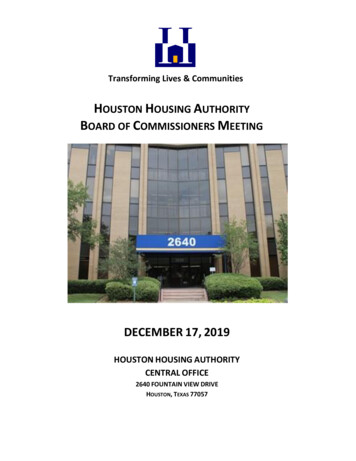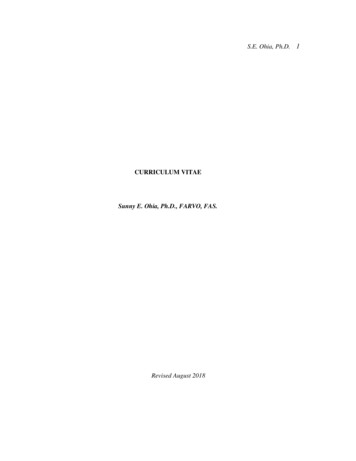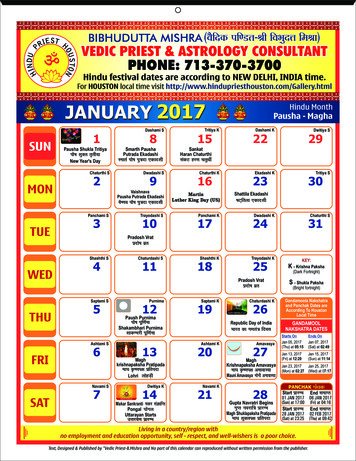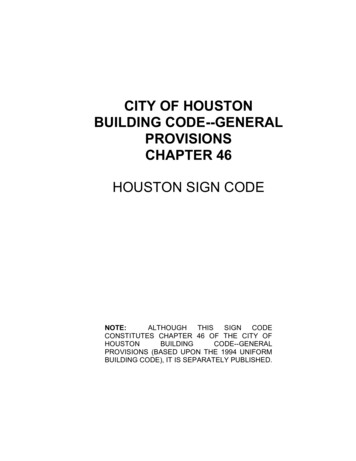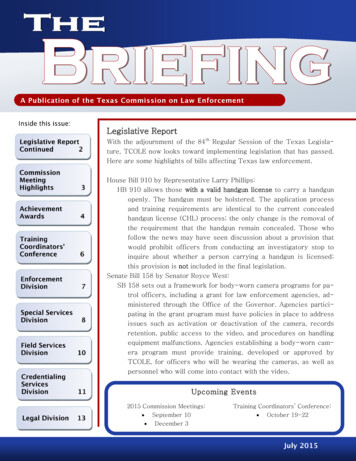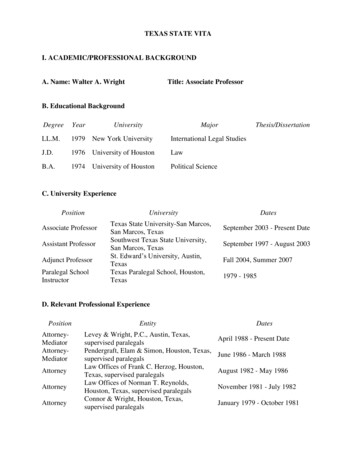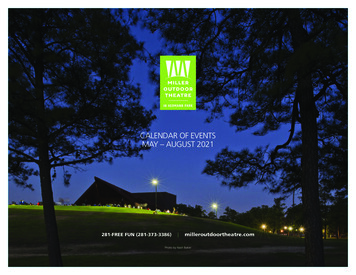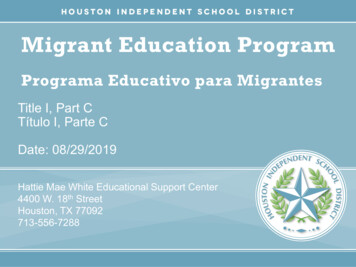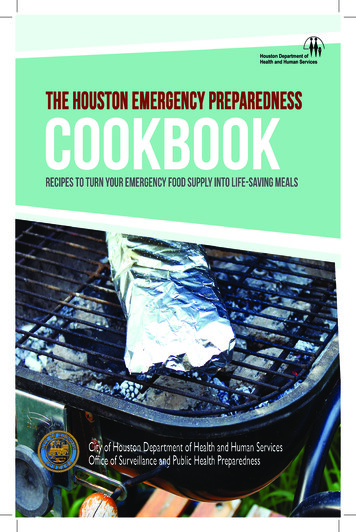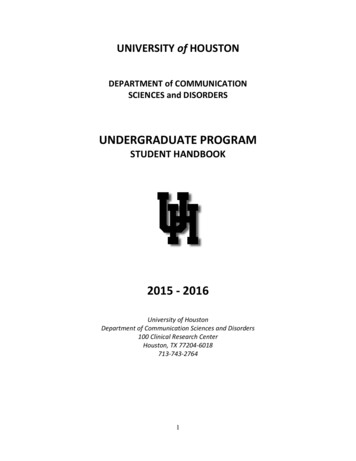
Transcription
UNIVERSITY of HOUSTONDEPARTMENT of COMMUNICATIONSCIENCES and DISORDERSUNDERGRADUATE PROGRAMSTUDENT HANDBOOK2015 - 2016University of HoustonDepartment of Communication Sciences and Disorders100 Clinical Research CenterHouston, TX 77204-6018713-743-27641
Dear Undergraduate Student:Welcome to the Department of Communication Sciences and Disorders at the University ofHouston. The faculty and staff are proud of our department and we are delighted that you havechosen to study with us. A student with a major in Communication Sciences and Disorders ispreparing for a career as a speech-language pathologist or audiologist. Professionals in both fieldsprovide diagnostic and treatment services to individuals who exhibit a variety of communicationdisorders, and our program will expose you to many of these. In addition, a degree inCommunication Sciences and Disorders includes in-depth study of normal speech and languagedevelopment across the lifespan, speech and hearing science, cultural differences incommunication, and prevention of speech and hearing disorders. These are exciting and evolvingfields of study and you will find yourself constantly challenged to learn new information.The purpose of this handbook is to provide information about the department and therequirements for your program. It includes essential information that you will need during yourcourse of study, and it is important that you review these materials carefully, including theappendices. This handbook will be augmented by other information from the clinic and specificadvisors, and the catalogue of the University of Houston, which can be found on line at our homepage at www.class.uh.edu/comd. It is your responsibility to know the procedures for thisprogram and university policies, and the faculty will make every effort to work with you to ensureyour success. We are looking forward to guiding you in your academic and professionaldevelopment.Sincerely,Lynn M. Maher, PhDProfessor and ChairDepartment of Communication Sciences and Disorders2
Dear Students,Welcome to the undergraduate program in communication sciences and disorders at theUniversity of Houston. I am excited to have each of you here. I hope you are ready to learn notonly about the basics of speech-language pathology and audiology but also about research,professional ethics and linguistic and cultural diversity as well. As you complete your bachelor’sdegree in communication disorders, I expect that you will have experiences that will lead you tobe discerning learners no matter what your future holds.While the undergraduate program is not merely a stepping stone, it is not too early for you tobegin making plans for attending graduate school. Speak to your professors about their researchinterests. Look into scholarship opportunities within your community to help fund your studies.Get to know your fellow students. Surround yourself with friends who share your educationalvalues. Applying to graduate school will be much easier for you if you have a strong GPA and agood reputation among the faculty. Those come from hard work and diligence.As the undergraduate program coordinator, I encourage you to let me know if there is any waywe can improve the program. If you have specific questions about adding/dropping courses,course sequence, etc. please consult this handbook and contact your Undergraduate Advisor,Marla Moreno-Jordan.I look forward to getting to know all of you better as you learn and grow over the next few years.Sincerely,Martha Dunkelberger, Ph.D.Undergraduate Program Coordinator3
ContentsCOMD MISSION STATEMENT . 6PROGRAM GOALS . 6Goal 1:Teaching . 6Goal 2:Scholarship. 6Goal 3:Service . 6ACCREDITATION . 6FACULTY AND STAFF . 7ADJUNCT FACULTY. 9EMERITUS FACULTY . 10SCHOLARSHIP INFORMATION . 11ACADEMIC ADVISING . 11COMPLAINT POLICY. 12SPECIAL NEEDS . 12UNDERGRADUATE PROGRAM OVERVIEW . 13COMD CORE courses:. 13 Courses in the major that are seven or more years old . 14MINOR REQUIREMENTS . 16DOUBLE MAJOR REQUIREMENTS . 16Minor . 16Double Major . 16CHANGE OF MAJOR . 17COURSE NUMBER. 17GRADES . 17ACADEMIC NOTICE, PROBATION, AND SUSPENSION . 19FERPA . 19TIPS FOR A SUCCESSFUL COLLEGE EXPERIENCE . 20GENERAL SEQUENCE OF ComD Courses . 21FRESHMAN CURRICULUM. 21GENERAL SEQUENCE OF ComD Courses . 22TRANSFER CURRICULUM . 22COURSE DESCRIPTION. 234
Elective Courses: . 24Prerequisite: COMD major and consent of department chair. . 24Prerequisite: junior standing, COMD major and consent of department chair. . 24NOTE TO RETURNING STUDENTS . 25TRANSFER STUDENTS . 25DROPPING COURSES . 26GRADUATION . 27GRADUATE SCHOOL APPLICATION AND ADMISSION PROCESS . 28PROFESSIONAL ORGANIZATIONS . 29APPENDIX A: UNIVERSITY OF HOUSTON POLICY ON ACADEMIC DISHONESTY . 31APPENDIX B: DEPARTMENT of COMMUNCATION SCIENCES and DISORDERS . 32GRIEVANCE POLICY . 32APPENDIX C: STUDENT FINANCIAL AID . 34APPENDIX . 36APPENDIX E: University of Houston Resources . 38APPENDIX F: ASHA CODE OF ETHICS . 40Principle of Ethics I . 40Principle of Ethics II . 41Principle of Ethics III . 42Principle of Ethics IV . 42Checklist - Communications Sciences and Disorders . 44This is not an official degree plan . 44Undergraduate Checklist . 445
COMD MISSION STATEMENTThe mission of the Department of Communication Sciences and Disorders at the University of Houston isto advance the understanding of normal and disordered speech, language and hearing through teaching,scholarship and service to the community.PROGRAM GOALSGoal 1:TeachingThe educational thrust of our mission includes pre-professional training in communication disorders for 1)undergraduate and post baccalaureate students, 2) professional training for graduate students, and 3)continuing education opportunities for professionals.Undergraduate level: Our goal is to recruit and retain well-rounded, liberally educated individuals from avariety of backgrounds. They will be educated to be: 1) knowledgeable about culturally diverse persons ofall ages, especially as they exist in an urban environment, 2) critical thinkers, and 3) well-prepared forgraduate study in communication disorders.Graduate level: Our goal is to provide the highest quality instruction, laboratory experiences and clinicalpractica to prepare students to function competently as speech-language pathologists in all professionalsettings. Graduates of the program will meet eligibility requirements for licensure by the state of Texasand certification by the American Speech-Language-Hearing Association. Graduates of the program will beprepared to pursue a terminal degree in Communication Sciences and Disorders or a related field.Goal 2:ScholarshipThe scholarship component of our mission consists of fostering an environment that encourages andsupports students and faculty to participate in scientific inquiry. The research activities will increase basicand applied knowledge in the areas of normal and disordered speech, language and hearing sciencesGoal 3:ServiceThe goal of the service component is to provide high quality speech, language and hearing services to thecommunity. Services will be provided on the University of Houston campus and at community outreachcenters to individuals from all cultures, ages, and abilities.ACCREDITATIONThe Council of Academic Accreditation (CAA) of the American Speech, Language, Hearing Association(ASHA) accredits the COMD graduate program. The Southern Association of Colleges and Schools (SACS)accredits the University of Houston.6
FACULTY AND STAFFLynn M. Maher, Ph.D. CCC-SLP. Professor and Department Chair. Dr. Lynn M. Maher is Professor andChair of the Department of Communication Sciences and Disorders at the University of Houston inHouston, TX. Dr. Maher has faculty appointments at Baylor College of Medicine, Rice University and theUniversity of Oslow, Norway. She is a Research Health Science Specialist at the Michael E. DeBakey VAMedical Center, Houston and an Investigator in the VA Brain Rehabilitation Research Center of Excellencein Gainesville, FL. Her research interests, funded by the NIH and the VA Rehab R & D, are in theunderstanding and rehabilitation of aphasia and related disorders.Margaret Lehman Blake, Ph.D. CCC-SLP. Associate Professor and Graduate Program Coordinator. Dr.Blake received her master's degree from Arizona State University and her doctorate from the University ofPittsburgh. She completed a post-doctoral fellowship at the Mayo Clinic. Dr. Blake teaches undergraduateand graduate courses in disorders of speech/language/cognition in adults. Her primary research interest islanguage disorders due to right hemisphere brain damage. She is one of the graduate advisors.Melissa Bruce, MS CCC-SLP, BRS-FD. Clinic Director. Melissa Bruce has 30 years of clinical and teachingexperience. After having been Clinic Director at the University of Vermont for eleven years, she hasreturned to the University of Houston where she oversees the clinical program, teaches the graduatecourse in fluency disorders and directs the Fluency Specialty Clinic. Ms. Bruce has presented locally,regionally, and nationally in the areas of family-centered service delivery, clinical training, and stutteringintervention. She is an ASHA Fellow, a Board Certified Fluency Specialist and Mentor, and a chartermember of the Lidcombe Program Trainers Consortium.Ferenc Bunta, Ph.D. Assistant Professor. Dr. Bunta’s research focuses on bilingual and cross-linguisticphonological acquisition. He received his Ph.D. from Arizona State University, Department of Speech andHearing Science and completed a postdoctoral fellowship in the Department of Communication Sciencesand Disorders at Temple University with a joint appointment in the Bilingual Language Laboratory and theEleanor M. Saffran Center for Cognitive Neuroscience. Dr. Bunta has taught courses in phonetics,phonology, speech and language acquisition, and speech science.Laura Cizek, MA CCC-SLP. Clinical Assistant Professor. Ms. Cizek teaches the undergraduate ClinicalProcedures course. She also supervises graduate students at the University Speech, Language and HearingClinic, A United Way Facility. Her experiences include supervision as well as diagnosis and treatment ofchildren and adults with various speech and language differences and disorders.Stephanie K. Daniels, Ph.D., CCC-SLP, Associate Professor. Dr. Daniels received her Ph.D. from LouisianaState University. She is a research speech pathologist at the Michael E. DeBakey VA Medical Center. Dr.Daniels is a Board Recognized Specialist in Swallowing and Swallowing Disorders. Her research, funded bythe Department of Veterans Affairs, is focused on neurogenic dysphagia. She teaches the graduate coursein dysphagia, the undergraduate anatomy and physiology course, and provides clinical education in adultcommunication disorders.Martha Dunkelberger, Ph.D. CCC-SLP. Clinical Assistant Professor and Undergraduate ProgramCoordinator. Dr. Dunkelberger earned her master’s degree from Governors State University near Chicago,IL and her PhD from the University of Houston, College of Education. She joined the University of Houston7
Department of Communication Sciences and Disorders in 1997 following eight years of clinical practice.Her research interests concern the developmental progression of phonological systems and literacy skillsin preschool and school aged children.Anny Castilla-Earls, Ph.D. Dr. Castilla-Earls' primary interests are language assessment and disorders inSpanish-speaking monolingual and bilingual children. Her current research is oriented to a) findgrammatical markers of language impairments that are accurate and stable across various levels ofbilingual proficiency, and b) examine current assessment practices in monolingual and bilingual children,and c) promote the systematic use of research-based practices in clinic and educational settings.Michelle Ivey, Ph.D., CCC-SLP, Assistant Clinical Professor. Dr. Ivey teaches courses in speech andlanguage disorders and development. Dr. Ivey also serves as a clinical education supervisor for on- and offcampus placements. She is the Speech Language Pathology Core Faculty for the LoneStar LeadershipEducation in and Neurodevelopmental Disabilities (LEND) grant. Dr. Ivey’s clinical work of over 20 yearsfocuses on children with communication disorders, especially with autism spectrum disorders. She hasworked in various placements and with children of all ages who have social pragmatic needs. She enjoyslearning about the best means to help these individuals improve communication and have happy andengaged interactions.Kia Noelle Johnson, Ph.D., CCC-SLP. Kia N. Johnson, PhD, CCC-SLP is an associate professor within theDepartment of Communication Sciences and Disorders at the University of Houston (Houston, TX). Shespecializes in fluency disorders, with a specific focus on young children who stutter. Dr. Johnson’s currentresearch interests include investigating the influences of temperamental variables on developmentalstuttering in young children from a behavioral/observational and electrophysiological perspective.Ashwini Joshi, Ph.D., CCC-SLP, Assistant Professor. Dr. Joshi received her doctorate from the University ofKentucky in Rehabilitation Sciences. Her research interests focus on voice and voice disorders. Herdoctoral research examined the effects of vocal fold paralysis on various brain regions and itscorresponding manifestation on parameters of voice assessment. Prior to starting at the University ofHouston, Dr. Joshi worked clinically with adults with acquired speech and language disorders.Jennifer Meeks, Au.D. CCC-A, F-AAA. Staff Audiologist for the University Speech, Language and HearingClinic: A United Way Facility. Dr. Meeks provides diagnostic and rehabilitative audiological services,including complete audiological evaluations, hearing aid fitting and aural rehabilitation. She develops andimplements clinical procedures and marketing programs. In addition she supervises graduate students forhearing screenings at City of Houston agencies.Marla Moreno-Jordan, BS. Undergraduate Academic Advisor for Communication Sciences and Disordersand American Sign Language Interpreting. Marla received her BS in Psychology from University ofHouston Clear Lake with a particular interest in adult learning styles. Formerly, she was an InstructionalAssistant for the School of Business at the University of Houston-Clear Lake.Byron Ross, Ph.D., CCC-SLP , Assistant Clinical Professor. Dr. Ross received his master’s degree fromUniversity of Central Arkansas and Ph. D. from University of Nebraska-Lincoln. Dr. Ross teaches Intro toCommunication Disorders, Speech and Language Development. His areas of interest include school agedchildren, adolescents, and young adults with autism spectrum disorders as well as assessment andintervention using augmentative/alternative communication with individuals with severe disabilities.8
Amber Thiessen, Ph.D., CCC-SLP, Assistant Professor. Dr. Thiessen received her Ph.D. from the Universityof Nebraska-Lincoln. Prior to completing her Ph.D., she worked as a speech-language pathologist withadults with acquired neurological disorders. Her research focuses on augmentative and alternativecommunication (AAC) for adults with acquired neurological disorders. Dr. Thiessen teaches graduatecourses in cognitive disorders and augmentative and alternative communication.ADJUNCT FACULTYIngrid Bowling, MS CCC-SLP Clinical Supervisor Ms. Bowling is a part-time Clinical Supervisor in theLanguage Learning Group at the University Speech, Language and Hearing Clinic: A United Way Facility.She also supervises graduate students at New Horizon Head Start. She has experience working in earlychildhood intervention, private practice, and public schools. Her areas of interest are pediatric speech andlanguage disorders and adult accent modification.Cay Cunningham, Ed.D. Dr. Cunningham is a consultant to the Early Childhood Intervention Program andconsultant to the University Speech, Language and Hearing: A United Way Facility Clinic’s Family-BasedTherapy regimen. She has expertise in family therapy and works with young children, especially infants,toddlers and preschoolers. She is a member of the American Psychological Association and the TexasPsychological Association.Angela Galatas, MA CCC-SLP. Clinic Supervisor. Ms. Galatas is a part-time Clinical Supervisor at theUniversity Speech, Language and Hearing Clinic: A United Way Facility. Her experience includes supervisionand intervention in adult neurogenic disorders.Eulalia (Lali) Gray, MA CCC-SLP, Clinical Supervisor. Mrs. Gray has been a supervisor for the Speech,Language and Hearing: A United Way Facility Outreach Speech and Language Program since 1993. Shewas a public school teacher of the deaf prior to becoming a speech-language pathologist specializing in thehearing-impaired. Now in private practice, she specializes in children with severe articulation disordersand autism. She continues to put her signing skills to use in her work with deaf adults.Dena Linda, MA CCC-SLP. Clinic Supervisor. Ms. Linda is a part-time Clinical Supervisor in the LanguageLearning Group at the University Speech, Language and Hearing Clinic: A United Way Facility. She hasexperience working with Alternative and Augmentative Communication Systems as well as working withthe preschool population.Carmen McGee, MA CCC-SLP, Clinical Supervisor. Ms. McGee is a part-time supervisor in the UniversitySpeech, Language and Hearing Clinic. She is experienced in the evaluation and treatment of childlanguage, articulation, and literacy disorders. Ms. McGee is currently the director of the Clinic’s adultaccent modification program. In addition, she maintains a private practice.Barbara O. Snelling, Au.D. CCC-A/SLP. Adjunct Assistant Clinical Professor. Dr. Snelling teaches in theareas of audiological assessment and rehabilitation, anatomy, neurology and physiology, and businessaspects of healthcare. She is a Fellow of the American Academy of Audiology.9
EMERITUS FACULTYMartin Adams, Ph.D. CCC-SLP. Professor Emeritus. Dr. Adams is former Chair of the program inCommunication Sciences and Disorders, with an area of expertise in fluency.Lynn S. Bliss, Ph.D. CCC-SLP. Professor Emeritus. Dr. Bliss was chair of the Communication Sciences andDisorders Department from 1997-2006. Dr. Bliss’ research focuses on the oral personal narratives ofchildren with language impairments. She has published articles on the cultural influences of narration. Sheis the recent author of two books, Discourse Impairments and Narrative Patterns. Dr. Bliss is an ASHAFellow and was a Fulbright Scholar on the Island of Cyprus.Susann Dowling, Ph.D. CCC-SLP. Professor Emeritus. Dr. Dowling taught in the areas of anatomy andphysiology, phonology and supervision. Her research focusedon phonological disorders, the supervisoryprocess and clinical training. Dr. Dowling is an ASHA Fellow, a teaching award winner and recipient of theSupervisor of the Year Award.10
SCHOLARSHIP INFORMATIONWe are proud to offer two scholarships for our undergraduates. Procedures for applying and eligibilityrequirements are below. Information pertaining to financial aid and additional scholarship opportunitiescan be found in Appendix C in this handbook.Rosemary Segovia Torres ScholarshipThis scholarship is funded by the Rosemary Segovia Torres scholarship Endowment in loving memory ofRosemary Segovia Torres. The scholarship is awarded to an undergraduate major in CommunicationSciences and Disorders who aspires to serve individuals with speech and language disorders. Eligibility: Full-time second year undergraduate student in good academic standing (3.0 or higher)who have been accepted into the COMD major. Preference will be given to students withdemonstrated financial need. Requirements: Two letters of recommendation from COMD faculty, personal statement of goalsand copy of updated transcripts. Award amount: 500 Application deadline: August 31st. Award date: SeptemberHACD Undergraduate Scholarship Award (www.HACD.org)This Scholarship is funded by the Houston Association for Communication Disorders. The scholarship isawarded to an undergraduate major in Communication Science and Disorders (or the equivalent) atUniversity of Houston, Lamar University or Texas Women’s University Eligibility: Undergraduate student who has completed at least 12 hours in speech pathology oraudiology. Full or part time students are eligible. Requirements: Three letters of reference along with a letter from the applicant and a currenttranscript. Award amount: 1000 Application deadline: mid-late March Award date: early May (at the HACD awards banquet)ACADEMIC ADVISINGMarla Moreno-Jordan is the undergraduate advisor. Students must attend a group advising meeting at thebeginning of his or her ComD program. Throughout the undergraduate program, additional group advisingcheckpoint meetings are held to declare a major, file a degree plan and prepare for graduation. All groupmeetings will be announced in classes as well as posted around the department. It is the students’obligation to attend these meetings and to make appointments for individual advising sessions with Ms.Moreno-Jordan as necessary. She is located in room 123 in the CRS building and can be contacted by email at mcmoreno@central.uh.edu or by phone at (713) 743-2764. We recommend that you attend atleast one individual advising session per semester.11
COMPLAINT POLICYComplainants are expected to file complaints at the appropriate level so that all due processprocedures may be followed. Students should take issues regarding grades and class policies to the courseinstructor/clinical supervisor first. It is always important to begin with the “offendingperson” so that she or he can have the opportunity to rectify the situation or to provide anexplanation or rationale. If the student is not satisfied after meeting with the instructor,the student may appeal to the Department Chair. If the issue continues to be unresolved,the student may file a formal grievance with the department. The details of the formalgrievance process for the Department of Communication Sciences and Disorders can befound in Appendix B of this handbook. If the student is not satisfied with the outcome ofthe grievance process, the student may file a formal grievance with the Dean of theCollege of Liberal Arts and Social Sciences (CLASS). Information on the CLASS formalgrievance policy can be found on the CLASS website:http://catalog.uh.edu/content.php?catoid 3&navoid 635#Academic Grievance PolicyThe Dean and the Provost are final levels of appeal at the University. Other non-grade related complaints or suggestions should be directed to the Chair of ComD. Thereis also a suggestion box in the ComD computer lab for anonymous complaints or suggestions. Complaints about the program may also be made in writing to the Council on AcademicAccreditation in Audiology and Speech-Language Pathology at: 2200 ResearchBoulevard #310, Rockville, MD 20850-3289 (800) 638-8255.SPECIAL NEEDSIf you are a person with a disability and you need accommodations to perform successfully in the program,you are required to contact the Center for Students with DisAbilities, (713) 743-5400. The Center willevaluate each student and identify his or her needs. Appropriate paperwork related to accommodationsmust be given to each instructor at the beginning of each semester for which you are requestingaccommodations. Accommodations are negotiated between the person making the request, the instructorand the Center for Students with DisAbilities.12
UNDERGRADUATE PROGRAM OVERVIEWDEPARTMENT of COMMUNICATION SCIENCES and DISORDERSUNIVERSITY OF HOUSTON The Department of Communicati
7 Lynn M. Maher, Ph.D. CCC-SLP. Professor and Department Chair. Dr. Lynn M. Maher is Professor and Chair of the Department of Communication Sciences and Disorders at the University of Houston in Houston, TX. Dr. Maher has faculty appointments at Baylor College of Medic
